Dalmatians are a unique breed, known for their distinctive coat and friendly nature. However, they are also prone to certain eye conditions that can affect their quality of life.
Understanding these common eye issues is vital for maintaining the health and happiness of your Dalmatian.
Proactive monitoring and regular vet check-ups can aid in the early detection and treatment of problems, mitigating the risk of serious complications.
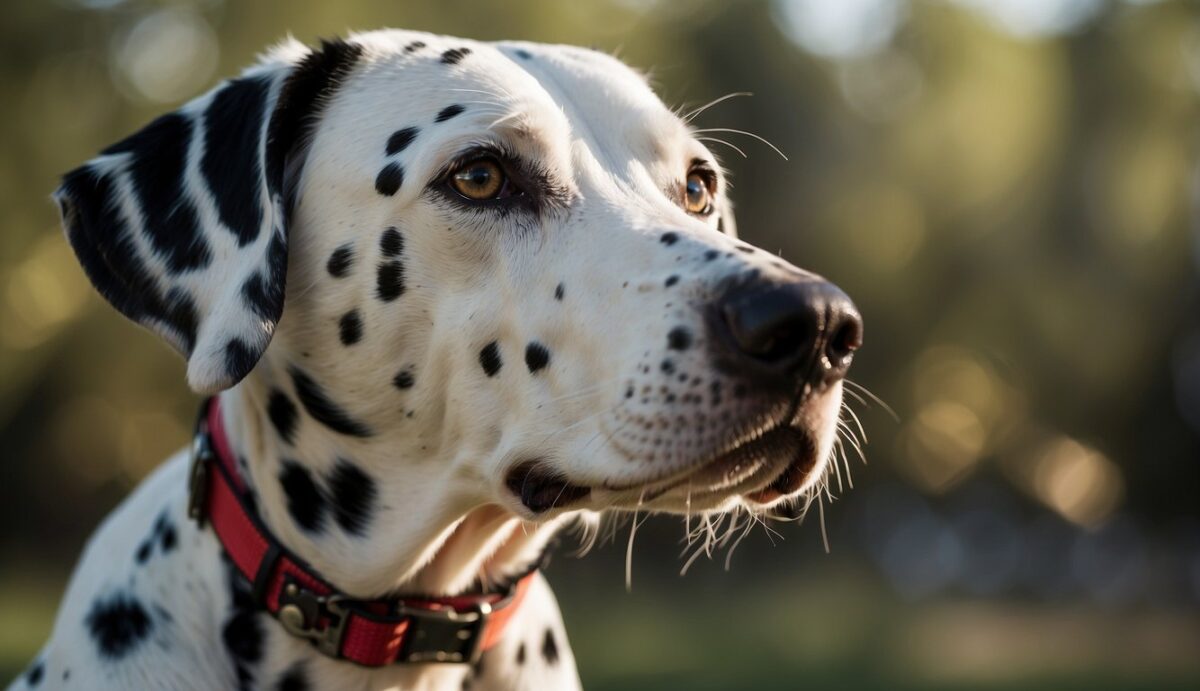
Preventive eye care is essential in reducing the incidence of eye health issues in Dalmatians.
Factors such as genetics, environment, diet, and overall health can influence the condition of their eyes.
By ensuring a healthy lifestyle and environment, and being attentive to your dog’s eye health, you can help safeguard your Dalmatian’s vision.
Remember, early intervention is key to managing eye health effectively.
Key Takeaways
- Regular vet visits can help detect eye conditions early.
- A healthy lifestyle supports overall eye health.
- Early intervention is crucial for managing eye conditions.
Dalmatian Health and Genetics

When it comes to your Dalmatian’s eye health, understanding the role of genetics is key. Certain health issues are more common in Dalmatians due to their unique genetic makeup, but with knowledge and proactive care, you can help ensure your dog’s well-being.
Common Health Issues
Your Dalmatian’s bright eyes are one of their most charming features, but they can be prone to specific eye conditions such as glaucoma and entropion.
Glaucoma is a condition where increased pressure within the eye can lead to pain and vision loss, while entropion causes the eyelid to roll inward, irritating the eye. Regular check-ups can catch these conditions early.
Hereditary Conditions
Dalmatians inherit more than just their spotted coats. Genetic predispositions can lead to hereditary conditions such as deafness and hip dysplasia.
Inherited deafness can be detected early in life through BAER testing, and while hip dysplasia involves the abnormal development of the hip joint, leading to arthritis or lameness. Keep an eye out for signs of discomfort in your pet.
Health Screening and Genetic Testing
Genetic testing provides a roadmap to your Dalmatian’s health, revealing risks for conditions like hyperuricosuria, which affects uric acid metabolism and can result in urinary or bladder stones.
Testing like this enables you to make informed decisions about your dog’s diet and health care.
Dilated cardiomyopathy and hypothyroidism are other conditions to be aware of. Regular screenings can offer peace of mind or an early action plan.
Diet and Nutrition

When it comes to your Dalmatian’s eye health, the food you provide plays a significant role. Notably, the right balance of nutrients can help fend off common conditions like cataracts and may contribute to overall ocular health. Here’s how you can support your spotted friend at different stages of their life.
Feeding Guidelines for Different Life Stages
Puppy: Your Dalmatian puppy requires a well-balanced diet that is rich in nutrients to support healthy growth and development. Make sure they eat high-quality puppy food that’s formulated for larger breeds.
- Frequency: Feed them three to four times a day.
- Portion sizes: Follow the guidelines on the dog food label, adjusting for your pup’s activity level and growth.
Adult: As your Dalmatian matures, their dietary needs change.
- Frequency: Reduce feeding to twice a day.
- Portion sizes: Portions should align with their energy output and to maintain a healthy weight to prevent joint stress.
Senior: With senior Dalmatians, it’s essential to maintain muscle mass while preventing obesity.
- Frequency: Continue with twice a day feeding.
- Portion sizes: You may need to adjust portions as their metabolism slows.
Special Dietary Considerations
Dalmatians are unique; they have a genetic predisposition to form uric acid stones. To manage this:
- Opt for a low-purine diet to reduce the risk of kidney and bladder stones.
- Dog food: Seek foods that are specially formulated for Dalmatians or urinary health.
Supplements for Optimal Health
While a balanced diet typically provides necessary nutrients, supplements can benefit your Dalmatian’s eye health and overall well-being.
- Omega-3 fatty acids – support retinal health and can reduce inflammation.
- Antioxidants (Vitamins C and E) – protect eye tissue from oxidative stress.
- Remember to consult your vet before adding supplements to ensure they’re needed and that they won’t interfere with your Dalmatian’s health issues.
Exercise and Training
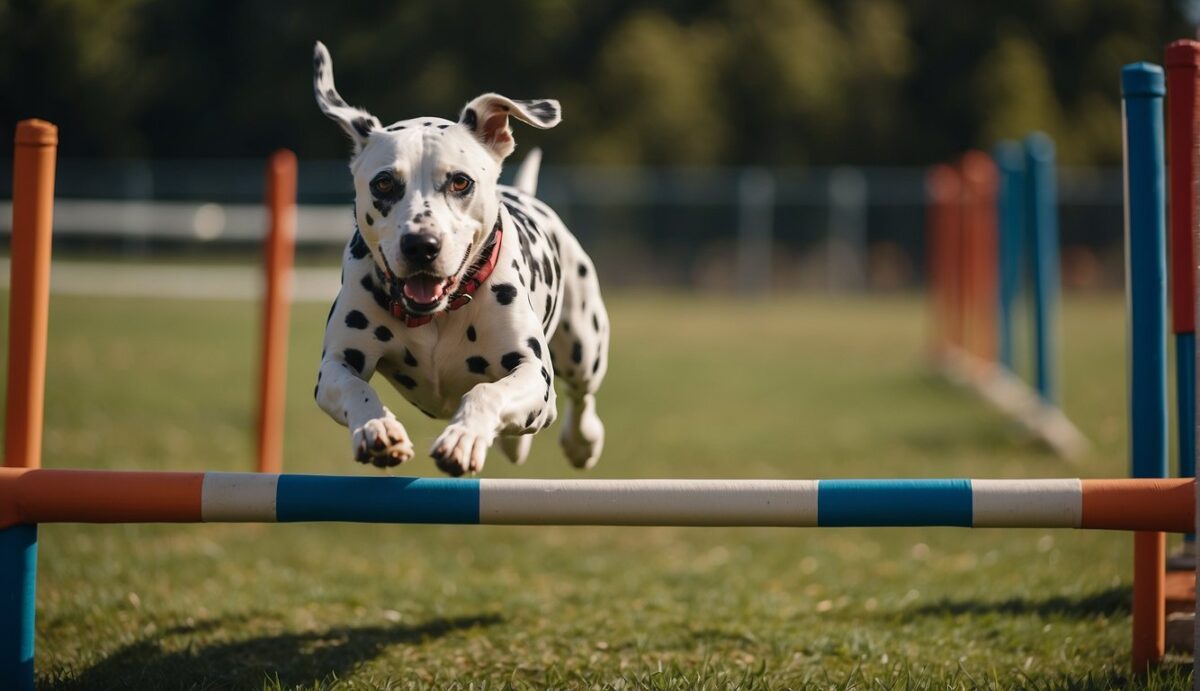
To ensure your Dalmatian thrives, balancing daily physical activity and consistent training is key. High energy and endurance are hallmarks of the breed, so channeling those qualities positively is crucial.
The Importance of Physical Activity
Your Dalmatian’s high energy levels demand regular exercise to maintain health and happiness.
Aim for 30 to 60 minutes of exercise daily, which can include:
- Long walks: Builds endurance and satisfies their need for activity.
- Jogging: A good outlet for their energy and to keep you and your dog fit.
- Play: Interactive games like fetch keep exercise fun and engaging.
Exercise isn’t just about physical health; it also contributes to mental well-being, helping to prevent undesirable behaviors that can stem from under-stimulation.
Mental Stimulation and Training
Mental exercise is just as important as physical for your Dalmatian. Training sessions serve dual purposes:
- Mental Stimulation: Keeps their mind sharp and focused.
- Development of Skills: Builds a foundation for good behavior.
Incorporate training into playtime or walks to keep your loyal companion engaged. Dalmatian puppies, especially, need early training to guide their development into well-adjusted adults.
Socializing and Agility
Dalmatians are naturally social creatures and excel in activities that involve both agility and social interaction. Consider the following:
- Agility Courses: Great for exercising both body and mind while reinforcing obedience and agility.
- Dog Parks: Provide opportunities for socializing and allow your Dalmatian to burn off excess energy.
Eye Care and Conditions
Ensuring the health of your Dalmatian’s eyes is crucial, as these dogs can be predisposed to certain conditions. Regular check-ups and awareness of symptoms can aid in maintaining your companion’s vision.
Preventive Eye Care
Routine Examinations: You should schedule annual eye exams with your veterinarian to catch any eye conditions early.
Detecting issues like glaucoma or entropion before they progress can save your Dalmatian’s sight.
Environmental Factors: Keep your Dalmatian’s living areas clean and free from irritants that can harm their eyes. Be mindful of plants, sharp objects, and chemicals that can cause injuries or reactions.
Diet and Supplements: A balanced diet rich in antioxidants can support eye health.
Supplements like omega-3 fatty acids may also be beneficial, but consult your vet before adding any to your dog’s regimen.
Common Eye Conditions in Dalmatians
- Progressive Retinal Atrophy (PRA): This is a genetic condition that causes the retina to deteriorate over time, leading to vision loss. There is no cure, but early diagnosis can help you manage the condition.
- Glaucoma: Characterized by increased pressure within the eye, glaucoma can lead to pain and vision loss. Immediate veterinary care is vital if you notice symptoms like redness or cloudiness in the eyes.
- Entropion: This is a condition where the eyelid rolls inwards, causing the eyelashes to rub against the cornea. It can result in discomfort and corneal damage. Surgical correction might be necessary.
Coat and Skin Care
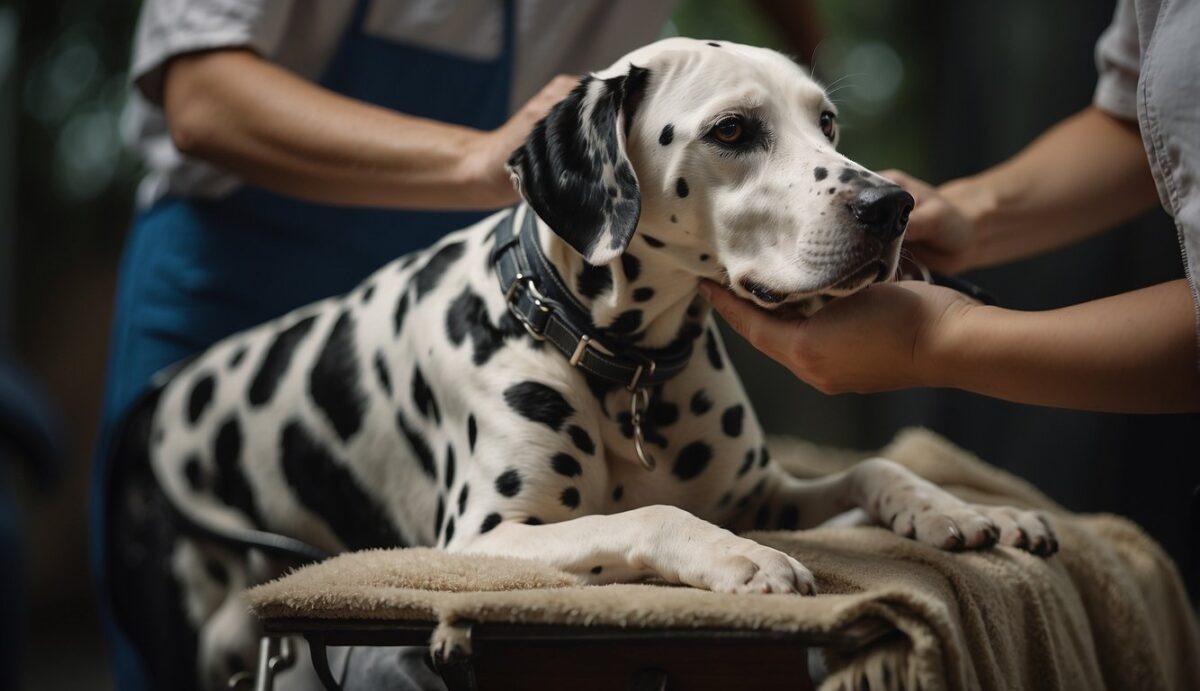
In caring for your Dalmatian, attention to coat and skin care is essential.
You’ll want to establish a grooming routine and be aware of common skin problems, including allergies and Dalmatian bronzing syndrome, to keep your spotted friend healthy and comfortable.
Grooming Needs
Your Dalmatian’s coat might look low-maintenance, but regular grooming is key.
- Brushing: Aim to brush your Dalmatian’s coat at least twice a week to remove loose hairs and distribute natural skin oils.
- Bathing: Bath your dog as necessary, typically every few months, unless they get dirty or have a skin condition that requires more frequent baths.
- Sensitive Skin: Use a shampoo formulated for sensitive skin to prevent irritation.
Following this routine not only keeps your Dalmatian looking good but also helps to reduce hair loss and maintain skin health.
Common Skin Problems and Allergies
Dalmatians may suffer from a few skin problems, so vigilance is key.
- Dermatitis: Inflamed, itchy skin that can be caused by allergies, insect bites, or poor diet.
- Dalmatian Bronzing Syndrome: This is a unique condition in which the skin develops a pink or bronze coloration, often accompanied by hair loss.
Prevention and Treatment:
- Routine Check-ups: Visit your vet regularly to catch any issues early.
- Sun Protection: Protect your Dalmatian from excessive sun exposure to prevent sunburn, which can lead to skin cancer.
- Diet: A balanced diet with the right nutrients can support skin health.
- Immediate Attention: Treat skin inflammation or hair loss promptly to prevent complications.
Reproductive Health
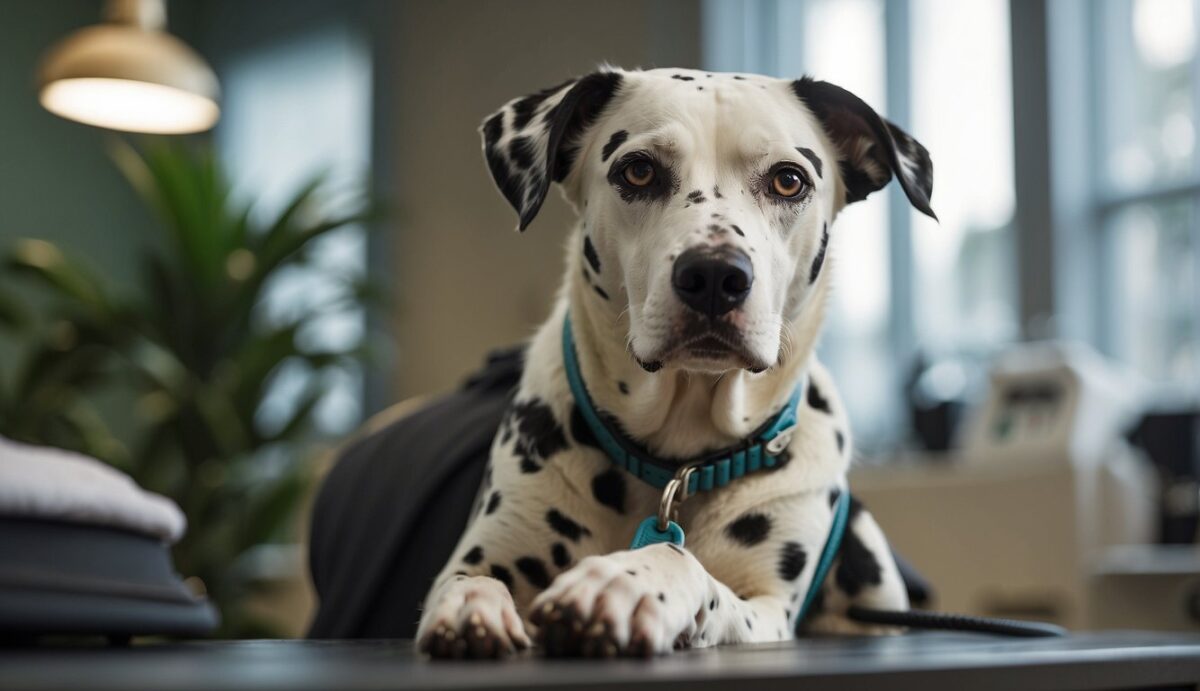
Taking care of your Dalmatian’s reproductive health is essential, especially if you are considering breeding.
It’s important to understand both the needs of a pregnant Dalmatian and the genetic considerations when breeding, such as the piebald gene and blue eyes, to ensure the health and wellbeing of the puppies.
Caring for a Pregnant Dalmatian
When your female dog is pregnant, her nutritional needs will change.
You’ll need to provide her with a high-quality diet that is rich in proteins and essential nutrients to support the growing puppies.
Regular veterinary check-ups are critical to monitor her health and the development of the puppies.
As she nears the end of her pregnancy, prepare a comfortable and quiet whelping area where she can give birth.
- Diet: Increase caloric intake as advised by the vet.
- Exercise: Maintain light exercise but avoid anything strenuous.
- Whelping Area: A clean, secluded, and soft-bedded space.
Health Concerns in Puppies and Breeding
Breeding Dalmatians comes with specific concerns.
As a reputable breeder, you should be aware of the risks of genetic conditions such as deafness and eye issues like blue eyes, which can be linked to the piebald gene. Testing the male and female dog for these conditions before breeding is crucial.
- Genetic Testing: Conduct BAER testing for deafness and eye exams.
- Piebald Gene: Be aware that this gene can be associated with certain health issues.
- Puppy Care: Ensure puppies receive necessary vaccinations and check-ups.
Lifestyle and Environment

Taking care of your Dalmatian’s eye health goes beyond medical check-ups; it’s also shaped by the lifestyle and environment you provide.
A safe and stimulating home, alongside managing common behavioral issues, plays a crucial role.
Creating a Dalmatian-Friendly Home
Your Dalmatian thrives in an environment that caters to its needs.
As house dogs, they require ample space to move around freely and expend their energy.
Secure your home to prevent accidental injuries that could harm their eyes, using baby gates or playpens to limit access to hazardous areas.
Ensure that your Dalmatian’s living space has:
- Adequate lighting: Appropriately lit areas can help prevent eye strain.
- Clean surroundings: Regularly clean floors and surfaces to keep irritants at bay.
- Eye-level hazards removed: Keep sharp objects or chemicals that could injure their eyes out of reach.
Common Behavioral Issues
Understanding your Dalmatian’s personality and intelligent nature is key to managing behavioral issues such as separation anxiety and barking.
These issues often stem from boredom or lack of exercise, which can indirectly affect your pet’s overall health, including their eyes.
- Separation Anxiety:
- Provide mental stimulation: Leave interactive toys to keep them occupied.
- Establish a routine: Consistent schedules can help reduce anxiety.
- Barking:
- Address the cause: Barking could signal a need for more physical activity.
- Positive reinforcement: Reward quiet behavior to encourage calmness.
Veterinary Care

Ensuring your Dalmatian maintains good eye health is crucial, and a significant part of that is regular veterinary care.
Routine Check-Ups and Vaccinations
Veterinary Visits: Plan for at least annual check-ups to catch any health issues early. Your vet can monitor your Dalmatian’s overall health and eye condition.
- Vaccinations: Keep up to date with vaccinations. While they primarily prevent infectious diseases, staying healthy also supports eye health.
- Deafness Screening: Dalmatians are prone to hearing loss. Routine vet visits should include auditory checks to ensure any related eye issues are monitored.
Dealing with Specific Health Conditions
Common Eye Conditions: Some Dalmatians may experience issues such as inflammation or allergies affecting their eyes. Immediate veterinary attention can prevent complications.
- Urinary Health: Urinary tract infections and urate stones can occur in Dalmatians, so discuss dietary strategies with your vet.
- Respiratory Signs: Laryngeal paralysis can cause noisy breathing, a condition your vet should evaluate.
- Epilepsy: This neurological disorder requires veterinary supervision for proper management, as it can sometimes link to eye health.
Preparation for Aging Dalmatians
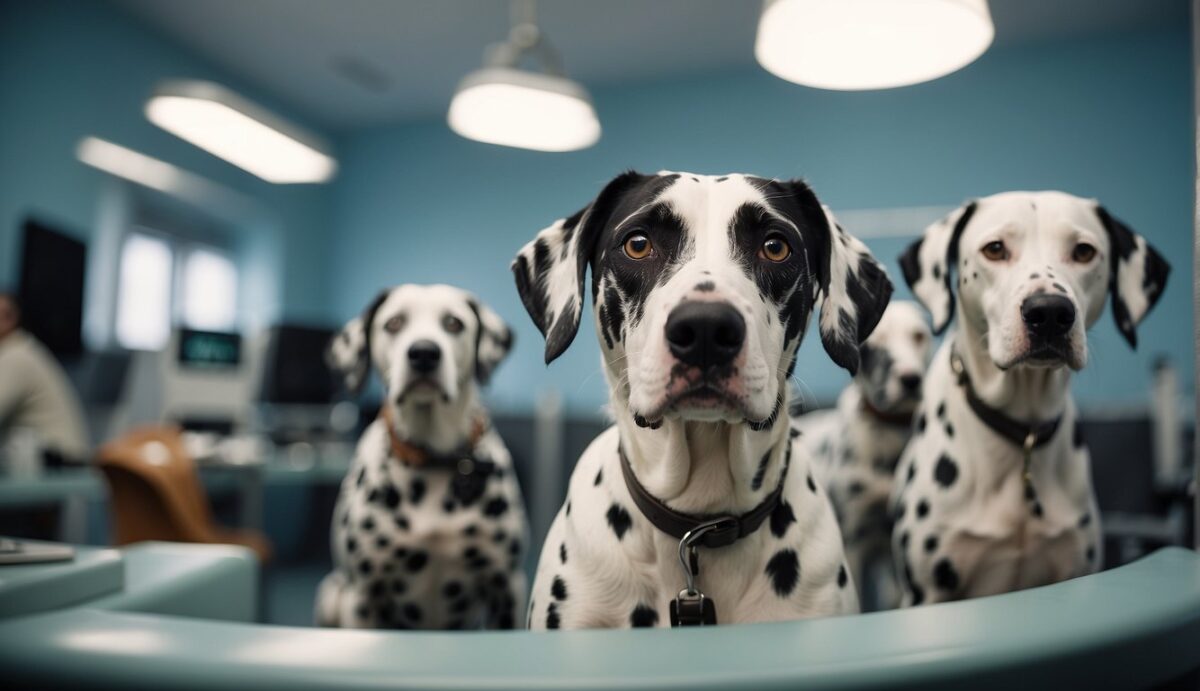
As your Dalmatian enters their senior years, there’s a shift in their care requirements.
Monitor for common health concerns, and embrace practices to assure comfort and wellness during their advanced age, typically around 12-14 years for this breed.
Senior Health Management
Regular Health Checks: It’s essential to schedule bi-annual vet visits for your Dalmatian to catch and manage early signs of age-related conditions, such as hip dysplasia, which is characterized by joint instability and can lead to arthritis.
- Weight Management:
- Keep your dog at a healthy weight to reduce stress on their hips.
- Implement a balanced diet tailored for senior dogs.
Exercise:
- Maintain a mild, consistent exercise routine to support joint health and mobility.
- Avoid intense activities that may exacerbate hip problems.
Home Environment:
- Provide orthopedic bedding to support your Dalmatian’s joints.
- Ensure easy access to food, water, and resting areas without the need for climbing stairs.
End-of-Life Care Considerations
Comfort is Paramount:
- Pay close attention to signs of discomfort, such as reluctance to move or changes in behavior, which may indicate pain from conditions like hip dysplasia.
Quality of Life:
- Regularly assess your Dalmatian’s quality of life in partnership with your veterinarian. Consider mobility aids if hip dysplasia is present and impacting movement.
Resources and Support
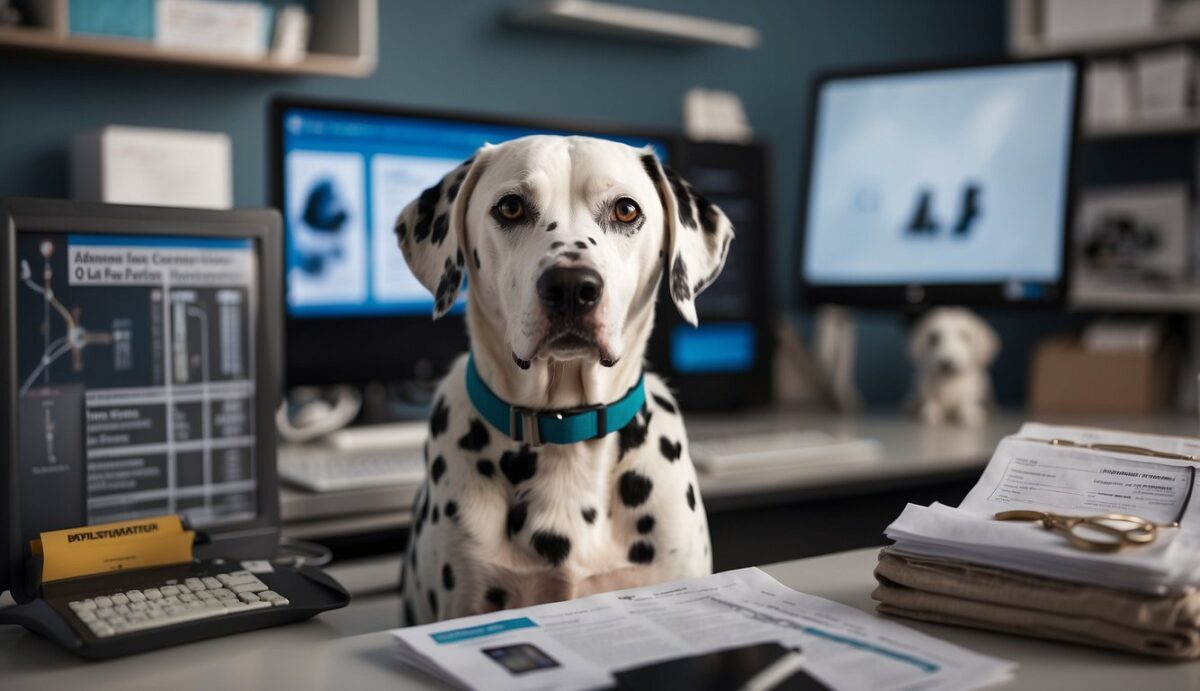
Access to robust resources and support can greatly enhance your Dalmatian’s eye care routine.
By connecting with clubs and understanding your insurance options, you’ll be more equipped to maintain your furry friend’s ocular health.
Dalmatian Clubs and Communities
Joining a Dalmatian club can be incredibly beneficial. The Dalmatian Club of America (DCA) is a leading resource that focuses on the well-being of Dalmatians, including eye health.
These communities provide vast information on Dalmatian health issues and can also link you to specialized veterinary care.
Here are ways to get involved:
- Join Online Forums: Become part of forums for advice and support from other Dalmatian owners.
- Attend Events: Participate in club-organized events that often involve health workshops.
Understanding Pet Insurance Options
Navigating pet insurance options can seem daunting, but it’s vital for managing potential health costs.
When considering insurance, look for policies that cover hereditary conditions as Dalmatians may inherit certain eye problems.
Here’s what you should focus on:
- Coverage Details: Ensure that the insurance plan covers breed-specific issues.
- Compare Plans: Look at different insurance providers to find the most comprehensive coverage for Dalmatian health issues.
Frequently Asked Questions
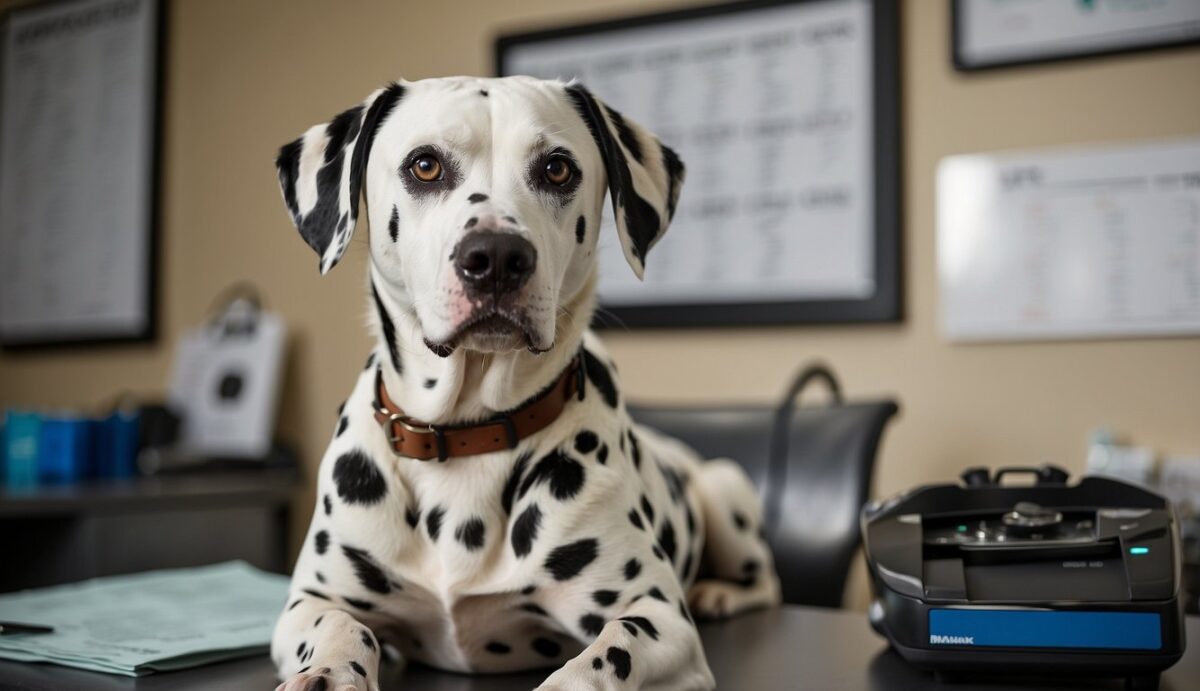
In this section, we’ll address your concerns about Dalmatian eye health, focusing on the most common conditions affecting this breed and how you can take steps to ensure their ocular well-being.
What are the most common eye conditions affecting Dalmatians?
Dalmatians are prone to various eye conditions, and one of the most prevalent is uveitis, which is an inflammation of the uvea, the middle layer of the eye.
How can I proactively care for my Dalmatian’s eye health?
Preventive care for your Dalmatian’s eyes includes regular veterinary check-ups. These help to catch and treat any conditions early on, alongside keeping their living environment clean to minimize the risk of infection.
What symptoms should I look out for regarding eye health in my Dalmatian?
Be vigilant for signs of eye discomfort in your Dalmatian, such as redness, swelling, discharge, or a noticeable change in their vision or behavior that might suggest eye health issues.
Is there a recommended diet to support eye health in Dalmatians?
While no specific diet guarantees eye health, a balanced diet rich in vitamins and nutrients, especially antioxidants like Vitamin A and E, can promote overall health and potentially benefit your Dalmatian’s eyes.
How often should a Dalmatian get an eye examination?
It’s recommended for Dalmatians to have an eye examination at least once a year. However, if your dog has a history of eye problems, more frequent check-ups may be necessary as recommended by your vet.
What are the genetic factors contributing to eye problems in Dalmatians?
Some eye conditions in Dalmatians may have genetic links. This makes it important to know the dog’s family history where possible.
If you’re buying a puppy, ask the breeder about genetic screening for heritable eye diseases.

